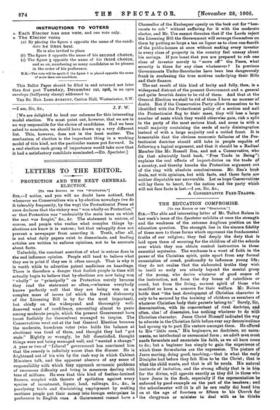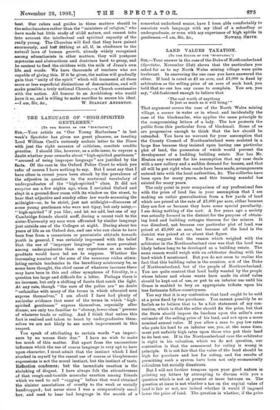THE EDUCATION COMPROMISE.
rt.() THE EDITOR OF THE "SPFCTATOR.1 6IR,—The able and interesting letter of Mr. Talbot Baines in last week's issue of the Spectator exhibits at once the strength and the weakness of the extreme Anglican position on the education question. The strength lies in the sincere fidelity of these men to those forms which represent the fundamental truths of our religion; they feel deeply the duty that is laid upon them of securing for the children of all the schools over which they can obtain control instruction in these essential mysteries. The weakness is a want of faith in the power of the Christian spirit, quite apart from any formal enunciation of creed, profoundly to influence young life; they do not realise that the elaborated truths they wish to instil so early are utterly beyond the mental grasp of the young, who derive whatever of good comes of the instruction, not from the dry bones of catechism or creed, but from the living, earnest spirit of those who manifest so keen a concern for their welfare. Mr. Baines holds. that "the best development of Christian character is only to be secured by the training of children as members of whatever Christian body their parents belong to." Surely, Sir, denomination, with its concomitant of rival doctrine, and often, alas! of dissension, has nothing whatever to do with Christian character. Jesus Christ Himself indicated the way to educate iu the Christian faith before ever any dencenioUtigna had sprung up to part gis vesture amongst them. He egged to His "little ones;' Hie beginners, no doctrines, 49 sacra- ments, no intellectual or ceremonial form ; an adult man must needs formulate and enunciate his faith, as we all have come to do; but a beginner has simply to gain the experience of which these formularies are the expression. The picture of Jesus moving, doing good, teaching,—•that is what the early Disciples had before they felt Him to be the Christ; that is what the child wants, and that is all he needs. His natural instincts of imitation, and the strong affinity that is in 14n for the divine, will operate exactly as tiny did in °loge who knew Jesus in the flesh, especially if the representation he enforced by good example on the part of the teachers ; and thci schoolmaster will (it is all he can really do) band him on at the age of fourteen or fifteen to his Church for the clergyman or minister to deal with as lie thinks test. Our rulers and guides in these matters should be the schoolmasters rather than the " ministers of religion," who 'have made but little study of ,child nature, and cannot take into account the- intellectual and spiritual capacity of the really. young. The Churches will find that they have gained enormously, and /oat fit/thing at all, if, in obedience to the nature.' laws of human growth, already widely recognised among:educationists in other matters, they will postpone Arteries and abstractions and doctrines bard to grasp, and be content to feed the children with, the milk of Jesus's own
words. We have thousands of teachers who are capable of giving this. If it be given, the nation will gradually gain that "unity of the spirit" which will transcend all these more or less superficial distinctions of denomination, and will make possible a truly national Church,—a Church coextensive with the nation. All honour to an Archbishop who would .111070 it..8o, and is willing to make sacrifice to secure his ideal.



















































 Previous page
Previous page